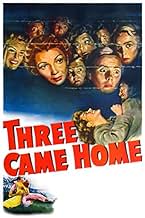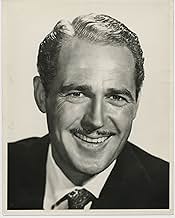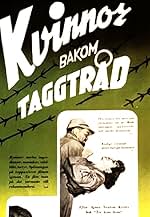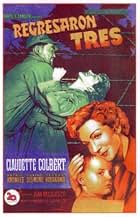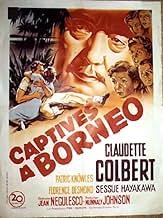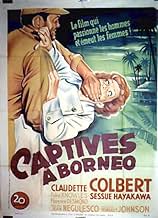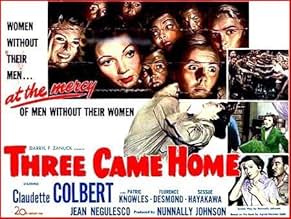Adicionar um enredo no seu idiomaDuring Word War II, American author Agnes Newton Keith is imprisoned by the Japanese in various POW camps in North Borneo and Sarawak.During Word War II, American author Agnes Newton Keith is imprisoned by the Japanese in various POW camps in North Borneo and Sarawak.During Word War II, American author Agnes Newton Keith is imprisoned by the Japanese in various POW camps in North Borneo and Sarawak.
- Direção
- Roteiristas
- Artistas
- Prêmios
- 3 vitórias e 1 indicação no total
- Elderly Resident
- (não creditado)
- English Girl
- (não creditado)
- English Radio Announcer
- (não creditado)
- English Radio Announcer
- (não creditado)
- Japanese Soldier
- (não creditado)
- Woman Prisoner
- (não creditado)
- Englishman
- (não creditado)
- Dr. Bandy
- (não creditado)
- Japanese Soldier
- (não creditado)
- Direção
- Roteiristas
- Elenco e equipe completos
- Produção, bilheteria e muito mais no IMDbPro
Avaliações em destaque
Several reviewers wrote a fairly common remark, especially about black-and-white pictures, in these forums: that this film is "surprisingly good" or "good for its time period." Let's take that idea to its logical conclusion. Was King Lear "good for 1606"? Was Mozart's Requiem "good for 1701"? Are Citizen Kane and The Maltese Falcon "good for 1942"?
No. All ages produce masterpieces as well as plenty of popular entertainments. 1950 had Ozzie & Harriet, but it also delivered All About Eve, The Third Man, Rashomon, and this film. The unfortunate truth is, many people believe that any outstanding work of art that preceded their generation is "surprising."
But I rush to add that indeed there was something different fifty years ago, not surprising, but important: Filmmakers showed restraint. Though it is about war, "Three Came Home" generates emotional power with very little staged brutality. There's more carnage in 7 seconds of "Se7en" than in the whole of this war film. Consider: Although it is brief and entirely bloodless, the scene where Claudette Colbert is tortured is almost unbearable.
But the greatest strength of this film is its fairness. Although all the brutality is perpetrated by the Japanese occupiers, they aren't villains. We come to respect the colonel played by the magnificent Sessue Hayakawa. In fact, when his character talks about his son's death at home-- and then says it happened at Hiroshima — it's another breathtakingly powerful moment, and our sympathy is immediately with him. As Colbert's character says to him, "Whatever the rest is, there's no difference in our hearts about our children."
Considering that this film was released only five years after the end of World War II, when anti-Japanese feeling was still very much present in the U.S., it's surprising that the horrors of life in Japanese captivity aren't played up more. Several instances of casual and calculated brutality are shown, but there is little here to compare with the shocking (and realistic) scenes in the much more recent film "Paradise Road." And the range of characterizations among the Japanese should be a welcome surprise to those who dismiss wartime and postwar American attitudes as uniformly jingoistic and racist. Yes, some of the Japanese are wantonly cruel, but others are obviously sympathetic to the prisoners, and as noted above, Col. Suga emerges not only as a reasonable commander but also as a noble man who can resist the temptation to take out his own grief and anger on the prisoners. Sadly, there were few men like Col. Suga in the real Borneo camps.
One unfortunate oversight: the action of the film covers almost four years of imprisonment and deprivation, but the prisoners appear just about as well-fed and energetic at the end as when they arrived.
So, unlike the first commentator on this film, I was actually pleased by the balance in its presentation. For although these days of Ozzie and Harriet rarely projected overt brutality realistically onto the screen, this film does provide a palpable sense of the suffering endured by European prisoners of war. At the same time, it did not end on this note: one of the more powerful Japanese camp directors suffers a loss in his family due to the Hiroshima bombing. And it is this counterbalance later in the film which I think causes me to disagree with the first commentator's view that this is something of a propaganda film.
Several things about this film stand out to me as justly bold for that era of film-making:
*an attempted rape is portrayed as well as a realistic presentation of its consequences. Accordingly, a complex moral lesson is imparted to the audience: far more complex, I might add, than the lessons Hollywood chooses to impart in many contemporary films with respect to such events. Perhaps this is simply an accident of the narrative being based on true events.
*the main character is a woman who is educated, brave and yet sympathizes with Asian culture (she is a scholar who has published an anthropological study which had been translated into Japanese) even if she vehemently opposes Japan's aggression.
*Hiroshima and the firebombings of Tokyo are presented from the Japanese viewpoint as horrific events and their effect in this movie is to engender sympathy for the ambiguous figure of the camp commander.
Of course this is still a Hollywood movie of the 50s and some of the behavior seems stilted and implausible to contemporary audiences. But compared to some other films made then - or even today - it is a breath of fresh air. I never expected to watch this whole film but was quite happy I did. I highly recommend it to others (which is why I bothered to write this!) as a date movie (in spite of the subject matter the strong female character and love story recommend it here) or a film to show children over ten (get a map so the child can locate Borneo) to introduce them to the many moral and political questions arising out of the war in the Pacific. Enjoy!
We know from Sessue Hayakawa's cultivated Japanese colonel that Hollywood is changing its perceptions of our former enemy. Cruel stereotypes do continue (presumably based on fact), but the colonel's character is humanized to an unusually sympathetic degree-- even his loss in the recent atomic bombing of Hiroshima is mentioned. Then too, it's well to remember that during the war our government interned US citizens of Japanese extraction in pretty inhospitable camps along the eastern Sierras, and probably illegally so.
Anyway, the movie has the look and feel of the real thing, while the producers should be saluted for using as many actual locations as possible. The fidelity shows. Since the story is the thing, the cast appropriately has no stars except for Colbert, which helps produce the realistic effect. There are a number of riveting and well-staged scenes. But the staging of the final crowd re-union scene strikes me as particularly well done. And, of course, there's that final heart-breaking view of the hilltop that still moves me, even 60 years later. All in all, this is the old Hollywood system at its sincere and de-glamorized best.
Você sabia?
- CuriosidadesAgnes Newton Keith, the writer of the book on which this film was based, wrote a letter about the film and its critical response. The letter was published in 'The New York Times' on 26 March 1950. It reads: "...I find that one or two critics (not 'The New York Times') question why the story was written....I wrote 'Three Came Home' for three reasons: For horror of war. I want others to shudder with me at it. For affection of my husband. When war nearly killed me, knowledge of our love kept me alive. And for a reminder to my son. I fought one war for him in prison camp. He survives because of me....The Japanese in 'Three Came Home' are as war made them, not as God did, and the same is true of the rest of us."
- Erros de gravaçãoColonel Suga says he attended the University of Washington for four years and Agnes reveals that she attended Berkeley. Suga goes on to say that Cal "murdered" Washington's football team. However, Tatsugi Suga arrived at Washington in 1924 and during the next four seasons California never defeated Washington. Only one football game would fit Suga's description: a 33-0 loss in 1933.
- Citações
[first lines]
Agnes Newton Keith: Six-degrees north of the Equator, in the heart of the East Indies, lies Sandakan, the tiny capital of British North Borneo. In Sandakan in 1941, there were 15 thousand Asiatics, 79 Europeans, and 1 American. I was the American. My name is Agnes Keith. I was born in Oak Park, Illinois, and graduated from the University of California at Berkeley. My husband is Harry Keith, a colonial official of British North Borneo. Borneo became my home when Harry and I were married. And it was in Sandakan that I bore one child, and lost another. And it was in Sandakan that we waited - 45 white men, 24 wives, and 11 children - through the anxious days of 1940 and '41. Certain only of one thing: that sooner or later, Japanese guns would join in the thunders of war, and Japanese troops would come down through the East Indies. The men waited because it was their duty; the women because it was their choice.
- ConexõesEdited into Your Afternoon Movie: Three Came Home (2023)
- Trilhas sonorasYou Say the Sweetest Things (Baby)
(uncredited)
Music by Harry Warren
Played on the radio before and after the news flash regarding Pearl Harbor
Principais escolhas
- How long is Three Came Home?Fornecido pela Alexa
Detalhes
- Data de lançamento
- País de origem
- Idiomas
- Também conhecido como
- Three Came Home
- Locações de filme
- Empresa de produção
- Consulte mais créditos da empresa na IMDbPro
Bilheteria
- Faturamento bruto nos EUA e Canadá
- US$ 1.900.000
- Tempo de duração1 hora 46 minutos
- Cor
- Proporção
- 1.37 : 1
Contribua para esta página


